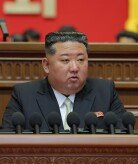[Editorial] Obama and the Korea-U.S. FTA
[Editorial] Obama and the Korea-U.S. FTA
Posted November. 07, 2008 05:23,
When the U.S. presidential election victory of Barack Obama was confirmed Tuesday, he began moving to tackle economic issues right away. Obama plans to unveil policy outlines for his administration focusing on economic measures this weekend. His initiative on the Korea-U.S. free trade agreement is attracting big interest in Korea.
Frank Jannuzi, Obamas policy adviser for Korea, said he mentioned the revision of the agreement not just for his campaign, but because he meant it. Obama has called the deal badly flawed, saying it is unfair for Korea to export about 700,000 cars per year to the United States while only importing 5,000 American cars.
The Korean government and the ruling Grand National Party held the first meeting of a joint task force on the deals ratification yesterday. Both sides reaffirmed the principle of no renegotiation with the Obama administration through the agreements early ratification. They see that ratifying the agreement early is a preemptive strategy to stop exports to the U.S market from falling. Senior presidential secretary for public relations Park Hyung-joon told a radio interview, We must ratify the free trade agreement early and try to help the new U.S. administration pass the deal.
Skeptics, however, question if early ratification can pressure the U.S. administration and Congress. Main opposition Democratic Party leader Chung Sye-kyun says this is unrealistic. Even if Korea ratifies the agreement, the Obama administration could still demand a renegotiation. If Seoul is forced into accepting, anti-American sentiment could grow in Korea.
Some predict that the agreement will not be ratified before the next congressional session starting after Labor Day next year, given Congress schedule. They advise a wait-and-see approach while deliberating some 20 pending bills necessary for ratification and the creation of complementary measures rather than rush to ratify the deal.
Obama should also know that the imbalance in car trade is because the U.S. automotive industry has failed to meet the needs of Korean consumers. He should seriously consider if blocking ratification will help the United States in its global strategies. Instead, Korea can do the United States a favor by promoting the sale of American beef, a meat which Korean department stores or big retailers are not yet selling.






![한그릇 1만5000원 봄동비빔밥 ‘품절’…제2의 두쫀쿠?[요즘소비]](https://dimg.donga.com/c/138/175/90/1/wps/NEWS/IMAGE/2026/02/27/133437451.3.jpg)
